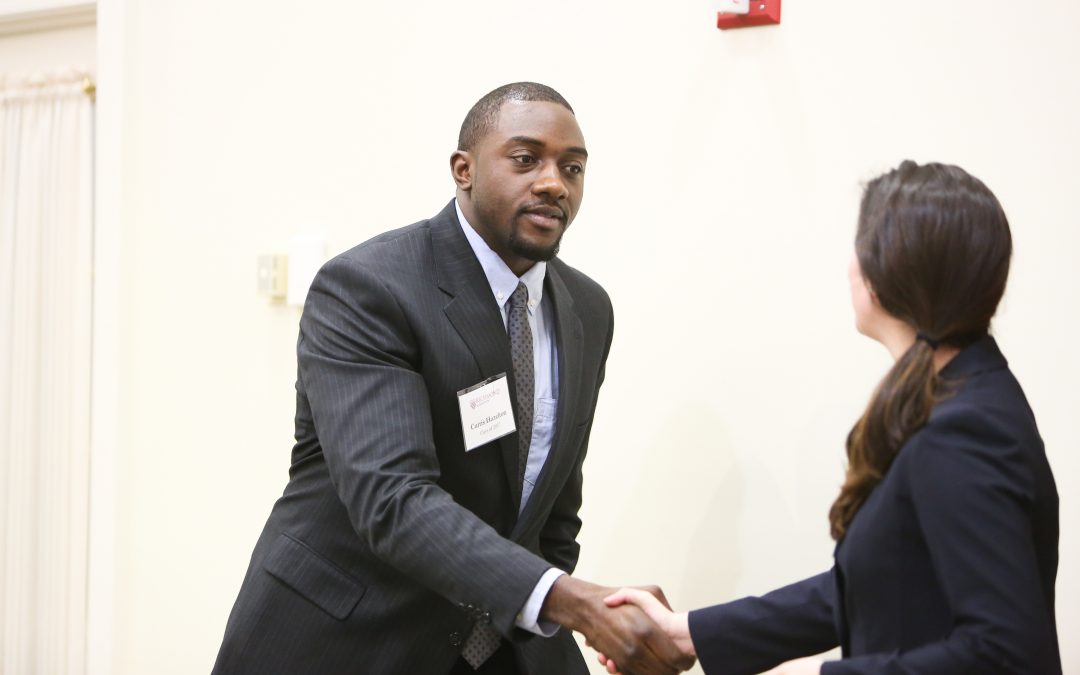by Mary Crane
Every professional services organization seeks candidates who have a firm grasp of one term: professionalism. Recruiters openly tell me that they only hire candidates who look like a professional, sound like a professional, and most importantly, demonstrate professionalism in their behaviors and attitudes.
With this in mind, job candidates and recruiters should focus on the following:
Dress the Part
Dressing the part is a cinch. In most cases, a nicely tailored navy blue suit, with a white shirt or blouse, and a tie for the gentlemen works perfectly. Virtually everyone—tall and short, thin and not so thin—looks like a gazillion dollars in an interview outfit of this nature. Besides, every political consulting firm in the county has tested this “uniform” with focus groups, and they consistently find that it communicates competence and trustworthiness.
Ladies, you have a little more discretion than your male counterparts. To the extent you opt for an outfit other than a navy blue suit, make sure that your attire does not detract from the key messages you wish to convey throughout your interview. Choose conservative over flamboyant.
Sound the Part
Sounding professional can be a bit more challenging. To succeed, focus on three big concepts:
Concentrate. Many students spend their lives texting and tweeting, something you must not do during an interview. Please do not take your smartphone into an interview. If you expect an emergency message—and I do mean a genuine emergency—carry your phone with you, turn it to vibrate, and slip it into your suit coat pocket or a portfolio. At the very beginning of your interview, explain the situation to your interviewer and then concentrate on each question you receive.
Communicate confidence. Avoid verbal mistakes that can make you appear less than secure in your own abilities, including: speaking too quickly; speaking too quietly; and discounting your own comments. In the latter case, know that whenever you start a sentence with, “This probably isn’t important, but …,” you have discounted any words that immediately follow.
Avoid space fillers. When they don’t know what to say next, lots of job candidates use space fillers, including “uh,” “ah,” “you know,” or “like.” As soon as you hear a couple of these creep into your language, stop, look directly at your interviewer, and say, “This is important. Please give me a moment to gather my thoughts.” Then do just that. Think about what you wish to say and then express yourself succinctly.
Prove Your Professionalism
Invariably, an interviewer will say, “Tell me something about yourself.” This is your opportunity to demonstrate that you already possess attitudes that embody professionalism. To the extent you can reference specific behaviors that demonstrate your professionalism, be prepared to share these.
Following are five key professional attitudes and behaviors that most employers seek:
Preparedness. Employers seek workers who are prepared to tackle tasks from Day One. You can demonstrate your commitment to preparedness by discussing how you currently participate in several study groups in order to avoid last minute cramming for exams. If you worked during the summer, explain how you learned to set aside time each weekend to prepare for the upcoming week. By the way, show your commitment to preparedness by carrying several extra copies of your résumé with you to each interview … just in case an interviewer misplaces your paperwork.
Initiative. Employers seek workers who look for opportunities to solve problems without being asked. If you’ve returned from a summer job, discuss how you constantly stayed on the lookout for opportunities where you could contribute, from never leaving a copy machine without paper to offering to come into the office over the weekend to assist a document review team. If you have not entered the work world yet, talk about a time where you took initiative on a school project.
Feedback. Employers have zero interest in all the positive feedback that you’ve received throughout your life. They are deeply interested in the constructive feedback that you’ve received, and more importantly, how you responded to that feedback. An interviewer learns about your commitment to growth when you explain, “I was told my writing skills could use some improvement. So I immediately met with a recruiter and asked about retaining a writing coach. Within two weeks, my supervisor sent several emails with positive feedback indicating that I had shown improvement.”
Client service. Every professional services provider knows that providing superlative client service is fundamental to success. To the extent you’ve worked in a service industry—even if your employment was limited to waiting tables—explain your commitment to client service. For example, you could say, “I learned that it didn’t matter whether or not the chef thought some item should be served medium rare. If my customer wanted his steak ‘well done,’ I insisted on it.”
Grit. A whole body of research coming out of the University of Pennsylvania indicates that the best indicator of success is grit. It turns out that good old perseverance is more critical to long-term achievement than IQ or GPA. So tell an interviewer about a time when you showed resilience in the face of long odds. By the way, if you want to know just how gritty you are, visit Professor Angela Duckworth’s website.

